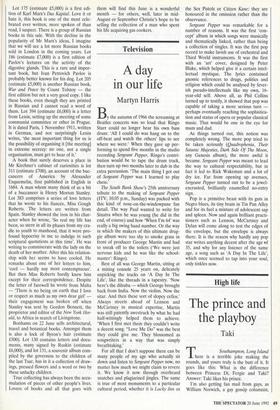Television
A day in our life
Martyn Harris
By the autumn of 1966 the screaming at Beatles concerts was so loud that Ringo Starr could no longer hear his own bass drum: 'All I could do was hang on to the off-beat and watch the others' lips to see where we were.' When they gave up per- forming to spend five months in the studio recording Sergeant Pepper, Ringo's contri- bution would be to tape the drum track, then turn up two months later to dub in the extra percussion. `The main thing I got out of Sergeant Pepper was I learned to play chess.'
The South Bank Show's 25th anniversary tribute to the making of Sergeant Pepper (ITV, 10.05 p.m., Sunday) was packed with this kind of nose-on-the-windowpane fan detail. The way Paul wanted to write for Sinatra when he was young (he did in the end, of course) and how 'When I'm 64' was really a big swing band number. Or the way in which the makers of this ultimate drug- gie album were too shy to smoke grass in front of producer George Martin and had to sneak off to the toilets (`We were just nervous .kids and he was like the school- master': Ringo).
Best of all was George Martin, sitting at a mixing console 25 years on, delicately unpicking the tracks on `A Day In The Life', like the threads in a tapestry. `Now here's the dilruba — which George brought back from India. Now the violins. Now the sitar. And then these sort of slopey cellos.' Always streets ahead of Lennon and McCartney in musical expertise, Martin was still patently awestruck by what he had half-wittingly helped them to achieve. 'When I first met them they couldn't write a decent song. "Love Me Do" was the best they could give me. They blossomed as songwriters in a way that was simply breathtaking.'
For all that I don't suppose there can be many people of my age who actually sit down and listen to Sergeant Pepper now, no matter how much we might claim to revere it. We know it now through overheard snatches and plagiarised jingles. The same is true of most monuments to a particular cultural period, whether it is Lucky Jim or the Sex Pistols or Citizen Kane: they are honoured in the omission rather than the observance.
Sergeant Pepper was remarkable for a number of reasons. It was the first 'con- cept' album in which songs were musically and thematically linked, rather than being a collection of singles. It was the first pop record to make lavish use of orchestral and Third World instruments. It was the first with an `art' cover, designed by Peter Blake, which helped give it a certain intel- lectual mystique. The lyrics contained gnomic references to drugs, politics and religion which could be analysed by fever- ish pseudo-intellectuals like my own, 16- year-old self. Above all, as Phil Collins turned up to testify, it showed that pop was capable of taking a more serious turn — perhaps eventually reaching the sophistica- tion and status of opera or popular classical music. That would be one in the eye for mum and dad.
As things turned out, this notion was completely wrong. The more pop tried to be taken seriously (Quadrophenia, Their Satanic Majesties, Dark Side Of The Moon, any Genesis album), the more awful it became. Sergeant Pepper was meant to lead the way to cultural respectability, but in fact it led to Rick Wakeman and a lot of dry ice. Far from opening up avenues, Sergeant Pepper turned out to be a jewel- encrusted, brilliantly enamelled no-entry sign.
Pop is a primitive beast with its guts in Negro blues, its tiny brain in Tin Pan Alley and for its fuel a mixture of adolescent sap and spleen. Now and again brilliant practi- tioners such as Lennon, McCartney and Dylan will come along to test the edges of the envelope, but the envelope is always there. It is the reason why hardly any pop star writes anything decent after the age of 35, and why for any listener of the same age, a song such as `A Day In The Life', which once seemed to tap into your soul, only tinkles now.


























































 Previous page
Previous page